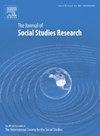Challenging preservice teachers’ understandings of globalization: Critical knowledge for global citizenship education
Abstract
This article addresses the demand for global content knowledge that the process of internationalization has placed on the preparation of social studies teachers. Drawing on scholarship about global perspectives in teacher education, this study examined what one cohort of preservice teachers learned about globalization during participation in a three-week, web-based, international relations simulation. The unit was part of a methods course designed to prepare preservice teachers to teach global issues and internationalize the curriculum. International simulations have long been touted as a means for learning challenging knowledge about global issues yet are rarely studied in teacher education. This qualitative study drew on concept maps and written responses completed before and after the simulation to document the preservice teachers’ learning. The analysis generated two findings: (1) preservice teachers acquired a shared, conceptual vocabulary for globalization that included the events and actors represented in the simulation; and (2) they also demonstrated a more systematic and critical understanding of the ways that power and conflict shaped the events and actors. The study contributes to the question of what teachers need to know to teach with global perspectives and how efforts to internationalize teacher education programs can foster such knowledge.

 求助内容:
求助内容: 应助结果提醒方式:
应助结果提醒方式:


